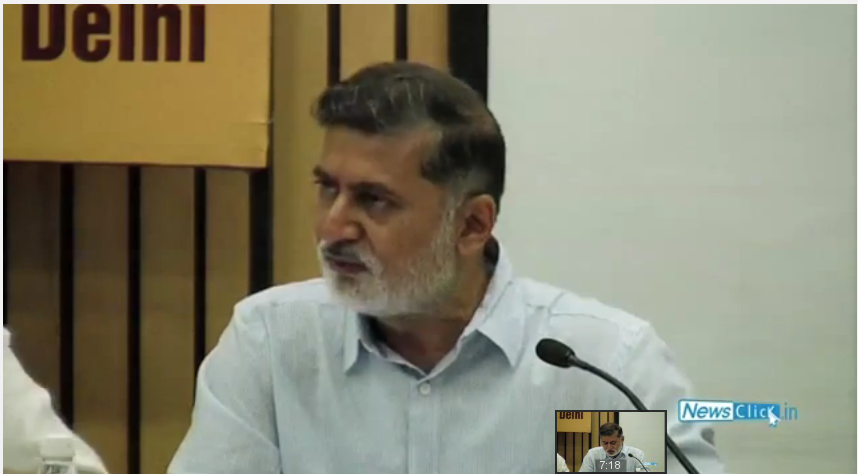New Government, New Policies: Reforms or Deforms?
Prof. Atul Sood while speaking at “Idea of India” conclave, discusses the core economic dimensions of the current government and how they interact with our understanding of the idea of India. He believes that the current government’s model of development, inspired by Gujarat, has reframed the understanding of the term development itself, with anti labor and pro corporate understanding of development. The current regime will more explicitly regulate labor – read “discipline” labour -- while deregulating capital. The government is also trying to help big business by speeding up the acquisition of land from farmers. Such steps help the investors and are against the interests of the farmers.

Rough Transcript:
I have been asked to talk about the economy. What I wish to do in the 10-15 min. that I have with you today is to do 2 things; share with you what I believe is the core economic dimensions of the current power dispensation and two, how these dimensions support their idea of India, and what it means for our idea of India, if, at all, it is possible to talk about our Idea of India, given India's diversity. If you look at the core economic dimensions of the current power dispensation, some of them are very obvious to the...you know... gathering here, it is the issue of corporate takeover, the whole policy regime is catering to the needs of the foreign investors, the state has been, over the years, diluting its core responsibilities and given the fact, that the Gujarat development model is the sort of inspiration for the current regime, it is also very clear of what kind of outcomes or experiences, large number of people are going to have, as a result of this development model. So I'm not going to spend too much time, even though the Gujarat development model and the outcomes of that model were really not very well discussed by the mainstream media but at least this gathering clearly notes, what kind of outcomes it has produced. So, I'm not going to spend time on that. Given these facts, given the fact that the Gujarat model was the core model around which the elections were, you know, discourse around elections happened, especially on the economic policy, I feel that what it has done, has that it has brought about newer ways of framing the development agenda and I am going to focus on 3 sort of dimensions, the 3 aspects of what I think, are the core dimensions of the new political or the current political dispensation and these pertain to an interestingly, these were started before the election results, in fact, in a discussion we've already on May 11th and 12th, there were a lot of writing to and fro happening on the core issues of development that this economic regime would initiate, given the context, that we already know of the last 15-20 years, and the three sort of, you know, core things that I want to focus on, as I said, are land, labour and center-state relations,. These I think, are the 3 dimensions of the new power dispensation, where a new framing of the development agenda is going to take place, but making core institutional changes in these 3 aspects. The 1st one, as I wish to call the issue, is of labour, is really an issue of regulating labour and de-regulating capital.
Once again, this is not something that this regime is going to do, it's not something that the UPA was not doing, and had not initiated. But if you see what has happened in Rajasthan very recently and the changes in the labour laws that have been proposed in Rajasthan, just reflects the fact, how the entry in the changes around labour would be made more explicitly. UPA have been doing these changes more indirectly, more implicitly, more through the back door. There is enough evidence to say that how even in the organised labour market, major institutional changes have been brought about in the last 10 years of UPA regime and in the previous years as well, but the labour changes in the labour legislations were not made that explicitly. Interestingly, what the Rajasthan proposal suggests is to make amendments in 3 labour legislations, one is the Industrial Disputes Act, the other is the Factories Act, and the other is the Contract Labour Act. Just to give you an estimate of what it means, the amendments proposed in the Industrial Disputes Act, by the Rajasthan government, which you know, just one aspect where it says that the state government has raised the limit of retrenchment to 300 workers. What it essentially means if we use 2009-10 data, an additional 20% of the industrial workforce would be affected by this change. So, earlier in that category, we had about 37.5% of the work force in the Rajasthan, and if this legislative change is brought about and implemented, we are looking at making the conditions of labour precarious for about 37+ upto 20 odd percent of labour force. So this is one just example of how the Industrial Disputes Act has been modified and the implications it has. I don't have the time to give the actual data what it means in terms of the contractual workers and so on and so forth, but in each instance, the 3 legislations that the Rajasthan government has proposed to change the Industrial Disputes Act, as I said the Factories Act, and the Contract Labour Act has serious implications, in terms of the challenges that it poses for the labour market. The second major change, I mean again, nationally there is enough evidence that this was already diluted through the arbitration tribunals and other methods that the UPA regime had adopted, but it had not made the explicit changes in the labour legislation and this would be made by the new regime. The second, is the issue of the land question and land acquisition. Again on 25th June, the NDA government has decided to formally review the implementation related to the issues of the law related with land in consultation with the state governments. The Union Minister, Mr. Nitin Gadkari had called a meeting with all revenue ministers of all provinces on June 27th to thrash out issues related to right to fair compensation, transparency in land acquisition, rehabilitation and the resettlement Act. Of course, the stated purpose of these meeting is to promote the interest of the farmers and those who lose their land and livelihood because of the land acquisition. And that's the stated agenda but, if you look at the details of the proposed agenda, what it is expected is that it was sort out and I put that in quotes, 'all issues related to land acquisition and facilitate the speed at which the land can be acquired by different investors including the global international investors'. The land question has gone through a major change in India in the last 30-40 years. The land question has now been transformed into a land acquisition question where pricing, compensation, resettlement, rehabilitation instead of acquisition, redistribution and viability of land have become the core issues. What the current discourse, again on land suggest is that they seem to believe that there is one single answer for the nation, as far as the land question is concerned. In other words, the economic value of land which might be of rivers and ponds, could be very different for tribal people, for marginalised owners, small farmers, land developers and in different parts of India. But what is in mind when you are looking at modifying the land act and the existing land act, is clearly one solution for the whole nation. So the land act, once again, is going to facilitate the industrial friendly environment and also appears to be looking at one solution for the nation. And the third one, which I think, is at the apex of both these two, is the centre's orientation about the development in the provinces. That's the larger issue of the center-state relations. And it's very interesting that it did not get the kind of attention in the media which it should have but the debate has already been leached by the sort of so called the economic thinkers of the current regime and what they are proposing, it has not yet been said by any of the government officials or ministers, but it has already been sort of, you know, debate has already been unleashed and what they are suggesting is very interesting, they are saying that, on matters on which state and center both have jurisdiction, land and labour are being two core examples, on both these instances, what they are proposing is, that the state governments will have the freedom to amend the laws if they want, subject to the fact, that they want to go beyond the amendments that the central government will make. So, if the central government amends the law, and if there is a state government which believes that no, that's not something so it's... let's say that the central amendment is going to integrate, you know, privatise the land market in a way that we have described or deregulate the labour market, as I have described, very intensely and if there is a state government, which wants to do it in slow steps, in moderated form or it wants to resist it, that option would not be available. The states will have to either follow the center's legislation or are allowed to modify the act if it goes beyond the what the centre has done. So, interestingly, this is being defined as empowering the states, so a new discourse, as I said a new framework of, you know, looking at development has come into fore, where you know, the whole issue of center-state relations creates the foundation under which the two core components or factors of production or... you know... land and labour and the conditions under which they operate for the market are going to be modified. And I think, this is the major challenge that the current economic regime is posing for us and there's a second part of my presentation which I am not going to do is to say how do you address it, what are the entry points we should not be taking and what are the entry points we should be taking in order to address these core concerns or shifts that are going to occur.
Get the latest reports & analysis with people's perspective on Protests, movements & deep analytical videos, discussions of the current affairs in your Telegram app. Subscribe to NewsClick's Telegram channel & get Real-Time updates on stories, as they get published on our website.
























